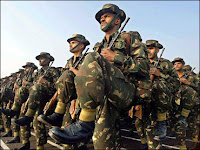 When Prince falls into the hole, call the Army! When Naxals are to be fought, call the Army! When the Police seems to be failing, call the Army! When bridges collapse, call the Army! Now, when houses collapse, call the Army! The purpose of this post is not to argue that the events mentioned here are not of a serious nature; in fact, they certainly are! However, what I argue is that if the Army needs to be called for almost everything that is of a 'serious' nature, would we call our civic administration 'not serious'? How does this reflect on the state of India's civic administration that a force that is anyway understaffed to carry out its primary duty is being diverted for other purposes?
When Prince falls into the hole, call the Army! When Naxals are to be fought, call the Army! When the Police seems to be failing, call the Army! When bridges collapse, call the Army! Now, when houses collapse, call the Army! The purpose of this post is not to argue that the events mentioned here are not of a serious nature; in fact, they certainly are! However, what I argue is that if the Army needs to be called for almost everything that is of a 'serious' nature, would we call our civic administration 'not serious'? How does this reflect on the state of India's civic administration that a force that is anyway understaffed to carry out its primary duty is being diverted for other purposes?The natural question arises - what is the harm in making the Army a quasi - civic agency? Why should the Army be limited to defending India's borders, especially at a time when India barely goes to war? The answer is two - fold.
Firstly, the relative tranquility on India's border itself is because of the Army's heavy deployment there. It is because there is a credible deterrent on India's borders that they remain relatively tranquil. If ever our restless neighbourhood sees that India's vigil has lowered, we should be assured that a major offensive is in the offing.
Secondly, a quasi - civic agency has to be placed under the control of a representative Government. This is because the regions that are serviced by a civic agency are well - populated areas, and hence there is a need for greater accountability. This makes the decision - making process less quick. The army operates in an environment where a certain level of accountability has to be forgone, in favour of greater preparedness. For this reason, the army should never be subordinated completely to the legislature or the executive of a nation. However, this does not mean that the Army should be allowed to turn rogue, like in our neighbourhood. Instead, the army should be under the joint control of the legislature, executive and the judiciary, especially the last, but not under the control of any one of them.
Now turning to the other side of the story - the lack of efficiency in our civil bodies - such as the police, the municipalities, the disaster rescue teams etc. These agencies have been eroded due to repeated interventions by the political class, and operate in an environment of dreading accusations of insubordination. The question that I leave the reader with is - how can we make these institutions free of political interference without removing them from the watch of the civilian Government?

No comments:
Post a Comment